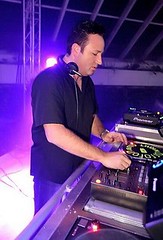Among many second and third generation Latinos the answer is, "No," making some wonder if Spanish will survive in America as more and more of us are born here.
Like many children of Latino immigrants, Alberto Padron learned Spanish straight out of the crib. “It was the only language spoken at home,” says the 37-year-old New Jersey native, whose mom and dad arrived from Cuba in the early ’60s. “No one ever sat down and taught me,” he adds. “My being bilingual is the natural consequence of being born bicultural and balancing two languages since day one.”
His teenage sons, on the other hand, had another experience growing up. Even though Padron and his wife, Angela, can easily hopscotch between both languages, the two boys only know English. “When you’re not thinking about it, that’s what you speak at home,” says Padron, who meets resistance when he tries to get them to switch to español. “Why are you forcing me to do this?” is the usual retort.
“I’m mostly disappointed in myself when my children’s ability to bond with our family is effectively crippled because Abuelita doesn’t speak English and the grandchildren don’t speak Spanish,” admits Padron, whose story points to a larger generational shift among American-born Latinos that raises concerns about the decline of our mother tongue and, as a consequence, the connection to our culture.
According to the Pew Hispanic Center, only 38 percent of third–generation Latinos—United States-born kids with foreign-born grandparents—are proficient in Spanish, compared to 79 percent of the second generation. “Some parents think they’ll be able to buck that trend, but they don’t understand how hard it is to raise a bilingual child in the United States,” says Ana Celia Zentella, Ph.D., a Mexican-Puerto Rican anthro-political linguist who studies the intersection between language and politics. “As soon as children see that there’s no need to talk to their parents in Spanish, they don’t.”
But Dr. Zentella, a professor emeritus at the University of California, San Diego, isn’t pointing fingers. “Parents shouldn’t be expected to do it on their own. They have so many other priorities when it comes to child rearing,” she says. “And many times the second generation feels like their own Spanish skills are weak and they’re reluctant to structure their child’s rearing around it.” The real problem, says Ana Roca, Ph.D., professor of Spanish at Florida International University, is the lack of bilingual education in public schools. “The United States does not give Spanish the importance it deserves,” says the cubana about the historical lack of funding for programs that help students maintain their heritage language. “The message is to learn English and forget about your mother tongue.”
But this loss of language across the generations cuts deeper than simply being unable to communicate with older relatives. It impacts Latino identity as well. “You can’t be a mexicano if you don’t know Spanish,” says Eugene García, Ph.D., a professor at Arizona State University whose family has lived in New Mexico since before it became part of the United States. “You don’t need to be proficient, but you need to know you can get by,” he adds. “Language is a key indicator that you’re part of a certain culture. Others will look at you and say, ‘You don’t speak Spanish? Then you’re not Mexican.’ ”
García’s controversial statement is something Richard Oceguera, a 42-year-old Californian of Mexican descent, has experienced firsthand. “Native speakers are resentful,” he says. “They’ll treat me like I think I’m better because I’ve become Americanized. Like I’m trying to be white. The way it comes across is as if I’m purposefully looking to slight my entire culture by not speaking Spanish. As if it was a choice for me. It wasn’t. My parents didn’t teach it to me,” says Oceguera, who has been studying the language for years in an effort to reconnect with his heritage, but still feels disconnected. “There’s a sense of separation,” he says.
Still, like Oceguera, many Latinos are embracing Spanish later in life as a way of reclaiming their roots. Among those is Destiny Lopez, a 36-year-old Chicana from Detroit, whose grandparents suffered discrimination when they first arrived from Mexico in the ’50s and didn’t raise Spanish-speaking children for fear that they would be marginalized. Growing up, Lopez had the traditions—mariachi music at family events, tamales during the holidays—but felt more American than Mexican. “There was a divide between those that spoke it and those that didn’t,” she says. “It’s frustrating that there’s something wrong with you, and that you’re perceived as less of a Latina because of that.”
Lopez, who has taken classes on and off for years, renewed her commitment with the birth of her daughter, Carmen. “I want to raise her bilingual, so that she’ll have more access to the culture. I now see the benefit of it in hindsight,” Lopez says. “I also want her to be aware of what the world around her is going to look like,” she adds, alluding to the latest Census reporting that Latinos make up 16.3 percent of the nation’s population at 50.5 million, a number that is projected to double by the year 2050.
Those figures don’t sit well with everyone, however, and fuel the kind of anti-Spanish rhetoric that makes its way into the legal system and exacerbates the loss of the language. Over 30 states have passed laws making English their official language, with Oklahoma persuading voters last year with the iconic military recruiting image of Uncle Sam emblazoned with the words, “This finger wasn’t made to press ‘one’ for English!” Dr. Zentella says, “There’s a big push communicating to all newcomers and people in general that the real American only needs one language.”
But that sentiment is not universally accepted across the United States. There are 440-plus public bilingual immersion schools that teach children English and their mother tongue, as well as how to appreciate both cultures. For example, Coral Way Bilingual K-8 Center in Miami teaches more than 1,500 students to speak, read and write in both English and Spanish, with subjects like math, science and social studies en español. “We’re performing at the same average and, in some cases, above schools that are not bilingual,” says the elementary school’s principal, Josephine Otero. “We have proven that our methods here at Coral Way do work, and that our students are successful and prepared to face the challenges ahead of them,” she recently told NPR.
Unfortunately, not everyone has access to schools like Coral Way—bilingual immersion is outlawed in California, Arizona, Colorado and Massachusetts—making it harder for the third generation and beyond to retain the language. But despite the trends, there is a steady influx of immigrants who may just keep the language alive. Every day, approximately 3,700 of us arrive in this country. “Their kids will be spoken to in Spanish and will learn Spanish,” asserts Dr. García. The key, he says, is “to override the power of English, which comes in everywhere else.”
Then you have Latinos like Oceguera and Lopez, who, no matter how many generations removed, prove that it’s never too late to learn the language. Perhaps Padron’s sons will follow that same path some day, for as Dr. Zentella says, choosing to become bilingual is a political act. “We as a community can make a major contribution to the United States by opening its linguistic, cultural and racial frontier,” she says. “[By speaking Spanish] you’re saying that the American dream isn’t dreamt only in English.”
--Grace Bastidas

 8:39 AM
8:39 AM
 Salsa Circuit
Salsa Circuit

 Posted in
Posted in























